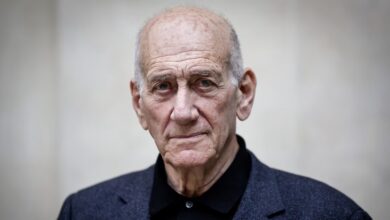A young Arab-American composer is putting some thick cracks in a Western-establishment perspective that has for decades divided traditional music into “Classical” (Western) and “World” (non-Western) spheres. Defying this simplistic dichotomy, the music of Mohamed Fairouz is a complicated hybrid of both Western musical structure and the maqam system of melodic modes used in classical Arabic music.
“The age of the white European male perspective on the world is not only old, it is over,” Fairouz told Al-Masry Al-Youm over Skype from New York.
The 25-year-old composer, both prodigious and prolific, having written three symphonies, an opera, hundreds of art songs, and over a dozen song cycles, and his music performed on four continents, including the most elite venues in the United States, is himself proof of his own statement.
Fairouz is constantly at work, spending approximately eight hours a day writing music. He is currently beginning an epic new opera, his second, that is slated to run about four hours. The libretto, written by Yvette Christianse and Rosalind Morris, is based on the 1987 novel “Cities of Salt” by Abdel Rahman Munif, which tells a post-apocalyptic tale of how oil transforms Bedouin society.
Fairouz describes it as “an opera on transformation … a big saga.”
Such forthright engagement with contemporary political issues combined with a strong sense of drama and storytelling is characteristic of Fairouz’s work, and a part of what makes him one of the most exciting young composers today.
Born in the United States, Fairouz received a traditional Western conservatory education at the New England Conservatory in Boston, Massachusetts. He says that his heritage plays an important role in his work.
“I grew up in a household where my parents were listening to Om Kalthoum, and I also right away developed an affinity for the elder Fairouz, as I like to call her,” says the composer of his early encounters with classical Arabic music.
He was intrigued by the radically different structures of traditional Western and maqam music. “Western music is very goal-oriented. It has a motif that is developed and worked out formally. It has an end, and if you work your way back, you know how you reached the end," he explains. "If you listen to Om Kalthoum for an evening, you have a very different thing. I think that is the most revolutionary difference, the form.”
In his music, Fairouz works to combine these forms, incorporating elements of maqam into symphonies and concertos. He is unique in working in this way, and laments the marginal position non-Western musical traditions have been relegated to in traditional Western training.
“The type of form that is being taught is predominantly Western, in a foundational sense. If there is any development [of other traditions], it is usually under the auspices of World Music, or even worse Ethnomusicology, which is about as horrible a word as one can imagine,” says Fairouz.
Fairouz is notable for his deep engagement with literature, and has often been quoted as saying, “I am obsessed with text.” Through careful choice of poetry, essays, diaries and textual works of all kinds, he further expands on the ideas present in his music.
Fairouz’s first opera, which premiered in New York in April, is entitled “Sumeida’s Song,” and is based on the play “Song of Death” by the great Egyptian playwright Tawfiq al-Hakim. Written in 1956 and set at the turn of the century, Hakim’s play tells the story of a young man’s sojourn from his village in Upper Egypt to Cairo, and his subsequent return from being educated at Al-Azhar University with a determination to change the rural way of life of his home.
The opera has been touted by some as the first major opera by an Arab composer. Whether or not this is technically true, it does mark a potential turning point. Giuseppe Verdi’s “Aida,” which is set in Cairo and premiered here, is performed regularly at the Cairo Opera House, along with a host of other works by Western composers with Egypt as their subject, such as a reinterpretation of Maurice Bejart’s ballet about Egyptian history,“Pyramide,” that was performed in early July.
“There are a lot of operas that are based in the Middle East, like Richard Strauss’s ‘Salomé,’ or ‘Aida,’ but take an Orientalist perspective toward the Middle East, both musically and in terms of the literary themes,” says Fairouz.
“My piece doesn’t do that. It takes as its foundational point Tawfiq al-Hakim and uses the musical landscape of the Arab world.”
While not all of Fairouz’s music engages with the Middle East as a subject, he is consistently attracted to underrepresented voices. He recently turned the diaries of Alma Mahler, wife of famed composer Gustav Mahler, into a beautiful, plaintive song cycle, “Jeder Mench,” for celebrated mezzo soprano Kate Lindsey. Fairouz was drawn to Alma's story as that of a creative woman who, because she was a woman, was never able to express her composing talent herself.
“How weird it is that Gustav Mahler told Alma Mahler that she couldn’t compose? How weird it is that this great genius had to live off of other geniuses and couldn’t explore her own genius?” says Fairouz.
He sees his cultural moment as one in which concepts of who can say what and in which way are being expanded.
A part of Fairouz’s engagement with the music and cultural history of the Middle East includes combining Arabic and Jewish traditions.
Fairouz says of his work with klezmer clarinetist David Krakauer on a concerto he composed this year entitled “Tahrir,” “He was living proof of our common ancestry, bringing the Jewish klezmer idiom into maqam stylings.”
In his Third Symphony, “Poems and Prayer,” which was workshopped in 2011 and is slated for full premiere in New York City in 2012, Fairouz incorporates works by Palestinian poet Mahmoud Darwish, as well as Israeli poet Yehuda Amechai, with ancient prayers from the Kaddish in Aramaic. Plans to perform the symphony on a tour that would include the Cairo Opera House have been put off due in part due to unrest in Egypt, but Fairouz remains hopeful he will be able to present this potentially controversial work in the Middle East.
“It is a statement of the counterpoint and coexistence of these texts. All of these texts are counterpoints in suffering,” says Fairouz, referring to a musical term for the relationship between two independent melodic lines that maintain harmonic interdependence. “The dream is to have it performed in this part of the world.”
This idea of representing cultural inclusivity in the very structure of music was addressed in an essay Fairouz wrote for the opinion section of the New York Times last month. His words:
In a contrapuntal passage of music, each line, even when woven together with other lines to form a cohesive tapestry, retains its own beauty. In this musical technique I see a lesson for the cultures of the world: to exist in counterpoint with one another, with each retaining its individual cultural traits, but enriching the whole.
Fairouz’s compositions themselves are emphatically melodic, with tunes that emerge and disappear, winding in and around one another in beautiful synthesis. His wind lines sometimes momentarily mirror vocal lines in eerie tandem only to diverge in surprising ways. His vision creates beautiful and exciting music that is the music of the world in a true and inclusive sense. While recognizing and maintaining individual characteristics of different traditions, he defies the need for classifications that limit and separate.




